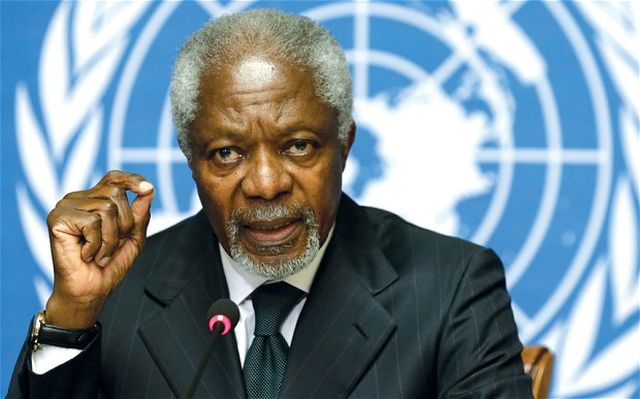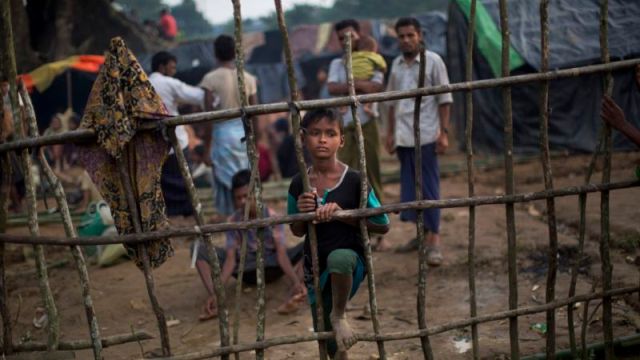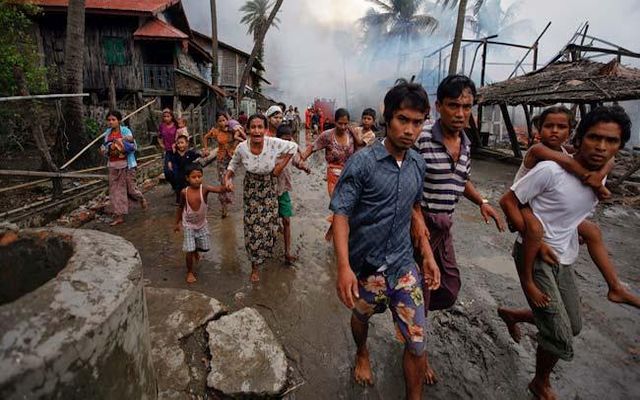
by Editor | May 25, 2021 | World

Former UN Secretary General Kofi Annan
Nay Pyi Taw : A Myanmar government committee investigating the Rohingya Muslim minority in Rakhine state said adhering to the rule of law was the best means to resolve the ongoing humanitarian crisis, an statement said on Friday.
A panel was set up this week to find “pragmatic” solutions to restore “security and the rule of law” in Rakhine, from where hundreds of thousands of Rohingya minority Muslims have fled to Bangladesh since an August 25 rebel attack on military and police outposts, reports Efe news.
The committee was convened to implement recommendations presented on August 24 by the Advisory Commission, a group of international observers led by former UN Secretary General Kofi Annan, the statement said.
A day before the current violence erupted, Annan had presented a plan to Myanmar authorities to deal with the sectarian problems between the Rohingya and the Buddhist majority gripping Rakhine state.
The UN estimates that at least 370,000 have so far fled across the border with about a 1,000 casualties since the crisis erupted.
Meanwhile, Zaw Htay, a spokesman for Myanmar’s Presidential Office, said the reason people abandoned their homes was because many were told to leave by family members who were involved in terrorist activities.
“Some of them are directly involved with terrorist activities and some are sympathizers for the terrorist group,” Zaw Htay wrote in an email to CNN on Thursday.
“And some are running away to avoid arrest by police because they had some connections with the terrorist group.”
The government has said that 176 out of 471, or 37.4 per cent of all Rohingya villages were now empty of people, and an additional 34 villages were “partially abandoned”.
The UN Secretary-General, Antonio Guterres, when asked on Wednesday if he considered the displacement of thousands of Rohingyas to be ethnic cleansing, said: “When one-third of the Rohingya population has got to flee the country, can you find a better word to describe it?”
“I call on Myanmar authorities to suspend military action, end the violence, uphold the rule of law and recognize the right of return of all those who had to leave the country.”
Prior to the current wave of violence, Myanmar’s population of Rohingya was estimated to number about 1 million.
—IANS

by Editor | May 25, 2021 | World
 United Nations : The security operation targeting Rohingya Muslims in Myanmar “seems a textbook example of ethnic cleansing”, the UN human rights chief Zeid Raad Al Hussein has said, urging the country to end the “cruel military operation” in its Rakhine state.
United Nations : The security operation targeting Rohingya Muslims in Myanmar “seems a textbook example of ethnic cleansing”, the UN human rights chief Zeid Raad Al Hussein has said, urging the country to end the “cruel military operation” in its Rakhine state.
More than 300,000 Rohingya Muslims have fled to Bangladesh since violence erupted there late last month. The military says it is responding to attacks by Rohingya militants and denies targeting civilians, BBC reported on Monday.
The violence began on August 25 when Rohingya militants attacked police posts in northern Rakhine, killing 12 security personnel.
Rohingyas who have fled Myanmar since then say the military responded with a brutal campaign, burning villages and attacking civilians in a bid to drive them out. Rakhine, the poorest region in Myanmar, is home to more than a million Rohingyas. They have faced decades of persecution in Buddhist-majority Myanmar, where they are not considered citizens.
Hussein, the United Nations High Commissioner for Human Rights, said the current operation in Rakhine was “clearly disproportionate”.
“We have received multiple reports and satellite imagery of security forces and local militia burning Rohingya villages, and consistent accounts of extrajudicial killings, including shooting fleeing civilians,” he said.
“I call on the government to end its current cruel military operation, with accountability for all violations that have occurred and to reverse the pattern of severe and widespread discrimination against the Rohingya population,” he said.
Latest reports put the number of those who have fled to Bangladesh at 313,000. Aid agencies say they are in desperate need of food, shelter and medical aid and that current resources are inadequate.
—IANS

by Editor | May 25, 2021 | Opinions
 By Amulya Ganguli,
By Amulya Ganguli,
The Union Minister of State for Home, Kiren Rijiju, is looking for a round of applause for not driving the Rohingya refugees in India into the sea or shooting them; all that he wants is their deportation.
It is, however, doubtful whether the process of exiling them will be uncomplicated since it is bound to raise humanitarian concerns in India and elsewhere.
It is not easy to harshly deny shelter to a group which has had to leave their own country, viz, Myanmar, in dire circumstances.
Rijiju probably believes that branding them as potential terrorists since they are Muslims will be persuasive enough. But it is not an argument which will be readily accepted.
Moreover, the issue of deportation has been complicated by, first, Myanmar’s reluctance to accept them and, secondly, by the unwillingness of the emigrants themselves to return to a “home” which they no longer consider safe in view of the recent army actions against them.
Even if the Myanmar army was targeting the insurgents among the Rohingyas, the fact remains that the victims were innocent men, women and children as is usually the case. Because of the conflict between the army and the rebels, the ordinary civilians had no option but to flee.
A contributory cause for their flight is the fact that their legitimacy as citizens of Myanmar has for long been under a cloud. Described as the most friendless people in the world, the Rohingyas are virtually strangers in their own country because the law in Myanmar does not recognise them as one of the country’s ethnic communities.
The reason is that the Rohingyas migrated over the centuries from what is now Bangladesh to Rakhine, previously Arakan, and continue to speak a patois of the Bengali language.
However, notwithstanding their presence in Rakhine from way back in the 15th century and earlier, they are still regarded as aliens by the Myanmar government and have faced repeated army crackdowns.
Even the ascent to power of the Nobel Laureate, Aung San Suu Kyi, who herself faced persecution from the military regime, has made little difference to the condition of the Rohingyas.
She has blamed the terrorists for the “huge iceberg of misinformation” about the community which has begun to attract the attention of the world, and has promised to protect everyone, whether they are citizens or not.
But the trek to Bangladesh of an estimated 164,000 Rohingyas and Malayasia’s assurance that it is ready to provide shelter to those travelling by boat to the country show that the world is waking up to the unfolding horror in Myanmar.
For all practical purposes, Myanmar can be said to have dumped its problem on its reluctant neighbours. But how long the latter can play host to this unassimilated group is open to question. There are already stirrings of unease in Bangladesh, which is bearing the brunt of the exodus from Myanmar.
That the Rohingyas will head for Bangladesh is understandable as it is their ancient homeland. But Dhaka is now trying to seek international assistance to settle some of the refugees on an uninhabited island in the Bay of Bengal since Bangladesh itself is overcrowded and some of its citizens are known to infiltrate into India.
Since the problem is bound to persist for some time, India cannot afford to appear unsympathetic about the tragedy.
It may not join Israel in assisting the army in Myanmar unlike the European Union which has an arms embargo in place lest the weaponry is used for “internal repression”. But for India to be in favour of the summary expulsion of the refugees amounts to being cold and uncaring.
The lack of compassion can seem all the more strange since India has traditionally opened its doors to persecuted minorities, starting from the Parsis in the 8th century to the Tibetans, the “East Pakistanis” in 1971, the Sri Lankan Tamils and others.
In contrast to this benevolence, the gruff rejection of the calls for temporary accommodation of the Rohingyas is patently unfeeling and brings little credit to the country.
The argument about the presence of terrorists is unconvincing since such elements cannot but constitute a tiny fraction of the total number of refugees. It is unfair and illogical to brand an entire community as terrorist.
What is apparently more to the point is the Hindutva lobby’s mistrust of the Muslims in general. But even if the government comprises people who subscribe to the Hindutva worldview, it should endeavour to raise itself above such ideological considerations in view of the oath of allegiance to a non-partisan constitution and look at an issue without any sectarian bias.
Such an absence of prejudice may be difficult for the Hindutva hardliners who still regard the Muslims in India as children of the 12th century invaders. But the government has to be far more open-minded.
(Amulya Ganguli is a political analyst. The views expressed are personal. He can be reached at amulyaganguli@gmail.com)
—IANS

by Editor | May 25, 2021 | Muslim World
 Tehran : Iran’s Foreign Ministry has voiced concerns over Myanmar’s continued crackdown against Rohingya muslims, the media reported on Tuesday.
Tehran : Iran’s Foreign Ministry has voiced concerns over Myanmar’s continued crackdown against Rohingya muslims, the media reported on Tuesday.
“The government of the Islamic republic of Iran is extremely worried by the continued violation of the rights of Muslims in Myanmar, which has led to their deaths and forced immigration,” Iran’s Foreign Ministry Spokesman Bahram Qasemi was cited as saying by Fars news agency, Xinhua reported.
Qasemi urged the government in Myanmar “to halt the continued violation of human rights of Muslims and end ongoing inhuman and violent situation in the country”.
He also asked Myanmar to adopt a realistic approach to a peaceful co-existence with the Rohingya.
The Rohingyas, one of the world’s largest stateless communities, are fleeing in droves toward Bangladesh, trying to escape the latest surge in violence in Rakhine state between a shadowy militant group and Myanmar’s military.
The UN refugee agency said on Monday that more than 3,000 Rohingya muslims had reached Bangladesh in the past three days, as people told of how they fled for their lives from Myanmar’s army.
—IANS

by Editor | May 25, 2021 | Muslim World
 Yangon : At least 71 people have been killed in the latest fighting between Rohingya Muslims and Myanmar security forces in the country’s Rakhine state, the office of de facto leader Aung San Suu Kyi said Friday.
Yangon : At least 71 people have been killed in the latest fighting between Rohingya Muslims and Myanmar security forces in the country’s Rakhine state, the office of de facto leader Aung San Suu Kyi said Friday.
In an updated toll, the State Counsellor’s office said 12 security officials had been killed and that “59 dead bodies of extremist Bengali terrorists” had been found — the phrase Myanmar authorities use to describe Rohingya militants. The fighting — still going on in some areas — marked a major escalation in a simmering conflict in the northwestern state since last October, when similar attacks prompted a big military sweep beset by allegations of serious human rights abuses, Reuters reported.
The Arakan Rohingya Salvation Army (ARSA), a group previously known as Harakah Al-Yaqin, or “Faith Movement,” which instigated the October attacks, claimed responsibility for the early morning offensive, and warned of more attacks. The treatment of approximately 1.1 million Muslim Rohingya has emerged as majority Buddhist Myanmar’s most contentious human rights issue as it makes a transition from decades of harsh military rule. It now appears to have spawned a potent insurgency, which has grown in size and morphed from an militant group into something more akin to a widespread movement, observers say.
The situation in the state deteriorated early this month when security forces began a new “clearance operation” in a remote mountain area. The army earlier said that one soldier, 10 police and 21 insurgents had been killed in the attacks. Two military sources contacted by Reuters said there may be more deaths. “In the early morning at 1 a.m., the extremist Bengali insurgents started their attack on the police post … with the man-made bombs and small weapons,” said the army, referring to the Rohingya with the derogatory term implying they are interlopers from Bangladesh.
It added the militants also used sticks and swords and destroyed bridges with explosives. Further attacks came at around 3 a.m. and 4 a.m., it said. The Rohingya are denied citizenship and are seen by many in Myanmar as illegal immigrants from Bangladesh, despite claiming roots in the region that go back centuries, with communities marginalized and occasionally subjected to communal violence. The military counter-offensive in October resulted in some 87,000 Rohingya fleeing to Bangladesh, where they joined many others who have fled from Myanmar over the past two decades or more.
The United Nations said Myanmar’s security forces likely committed crimes against humanity in the offensive that began in October. The military said about 150 Rohingya attacked an army base in Taung Bazar village in Buthidaung township, prompting the army to fight back. “They were planning to attack because we have found their camps, the caves and the bombs and masks inside the caves,” said Myanmar police spokesman Col. Myo Thu Soe.
The morning attack took place hours after a panel led by the former UN chief Kofi Annan advised the government on long-term solutions for the violence-riven state. Annan condemned the violence on Friday, saying that the “alleged scale and gravity of these attacks mark a worrying escalation of violence. No cause can justify such brutality and senseless killing.”
Military sources in Rakhine told Reuters they estimated the number of insurgents in the offensive stood at about 1,000 and that it encompassed both Maungdaw and Buthidaung townships — a much wider area compared with October. The leader of ARSA, Ata Ullah, has said hundreds of young Rohingya have joined the group, which claims to be waging a legitimate defense against the army and for human rights. “We have been taking our defensive actions against the Burmese marauding forces in more than 25 different places across the region. More soon!” the group said on a Twitter account believed to be linked to it.
Over the last several months the government has accused the insurgents of instigating a campaign of terror against village chiefs and killing government informers, disrupting government information networks. “The insurgents were able to organize such a huge attack because they were successful in organizing the information blackout,” said one of the military sources. “It’s an extremely serious situation which could lead to a major crisis. It’s not easy to know what has happened, but it’s clearly very worrying,” said Yangon-based analyst and former UN diplomat in Myanmar Richard Horsey. Bangladesh pushed back around 146 Rohingya trying to flee following the violence, S.M. Ariful Islam, a Border Guard Bangladesh officer, told Reuters.
Amid rising tensions over the past few weeks, more than 1,000 new refugees have fled to Bangladesh. “My cousin in our village back in northern Maungdaw told me about rising tensions there. Military is everywhere. People are crying, mourning the dead,” said Mohammed Shafi, who lives in a Rohingya refugee camp in Bangladesh near the Myanmar border. “This morning we had a prayer meeting in the Kutupalong refugee camp for the victims and for the wellbeing of our homeland. Things are turning real bad. It’s scary.”
—HA/IINA





